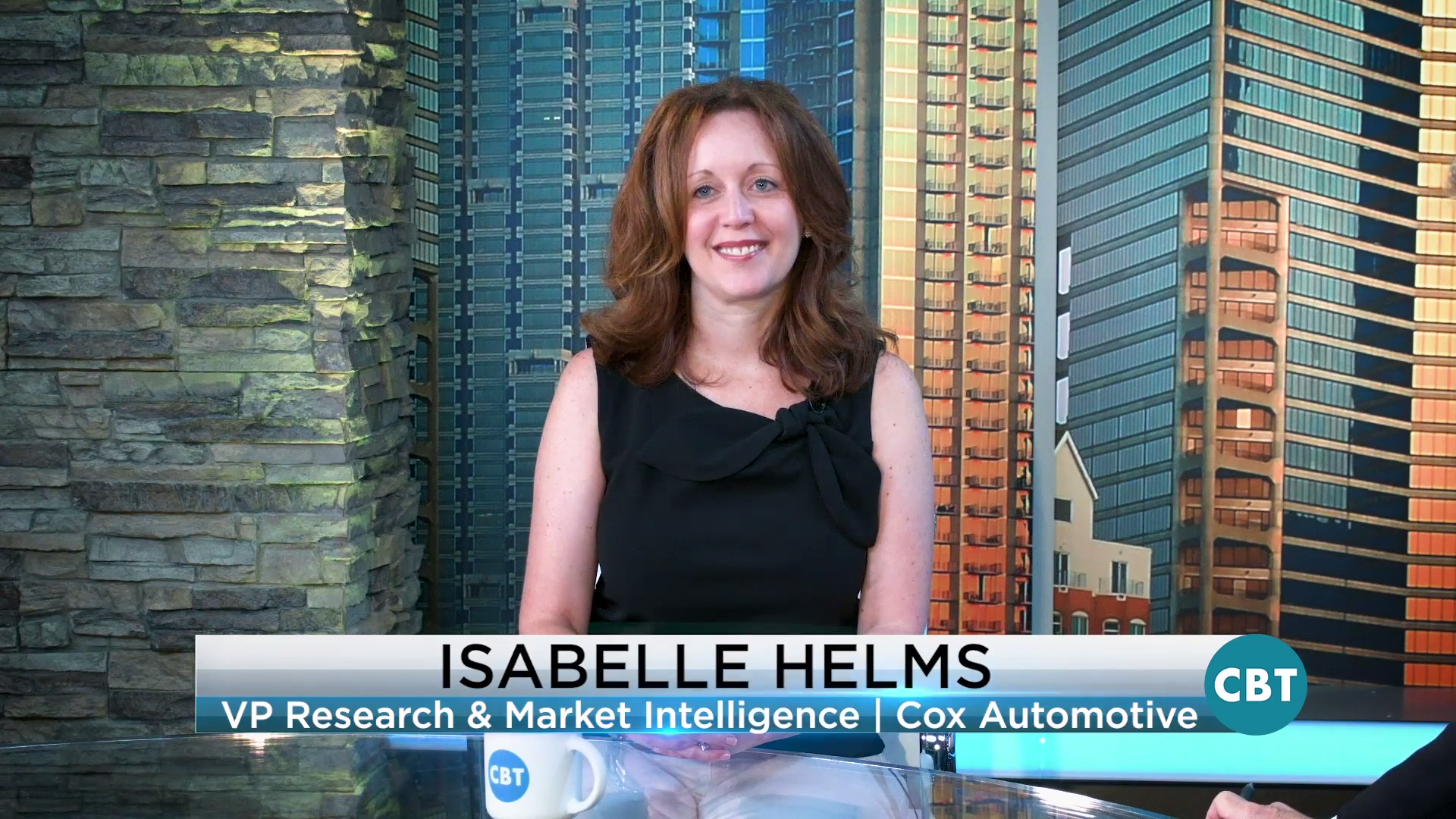Attracting the top talent is always on every dealer’s mind, however as the workforce begins to change, so should recruiting strategies. On today’s show, we take a look at our recent conversation with Isabelle Helms, Vice President of research and marketing intelligence for Cox Automotive. She discusses key findings from the 2019 Dealership Staffing Study, and what they mean for your dealership’s future recruiting efforts.
For this study, Isabelle tells how Cox Automotive spoke to franchise dealers on a regular basis in order to discover concerning trends for dealerships, one of which is turnover rates. Isabelle talks about why this is such a topic of concern for dealers and the best ways for them to combat this issue in their own dealerships.
To hear more from Isabelle check out the full interview above.
Jim Fitzpatrick:
Hello, everyone. Thanks so much for joining us on another edition of CBT News. We’re so happy to have with us in the studio today Ms. Isabelle Helms, who is Cox Automotive’s vice president research and market intelligence.
Jim Fitzpatrick:
Thanks so much for joining us again on CBT News.
Isabelle Helms:
Always a pleasure.
Jim Fitzpatrick:
Sure, so let’s jump right in here. You guys had a study, the latest Cox Automotive 2019 Dealership Staffing Study. It’s a mouthful. Right?
Isabelle Helms:
Yes, it is.
Jim Fitzpatrick:
Yeah, it’s must have been quite a study. Let’s jump right in. What sparked this research?
Isabelle Helms:
Sure. We speak with franchise dealers on a fairly regular basis, and one of the things that we see consistently is a quarter of franchise dealers tell us that dealership turnover is a top five concern for them, and it keeps them from moving their business forward, so… and thanks in large part to a 50-year low in unemployment rate.
Jim Fitzpatrick:
Right, very tough.
Isabelle Helms:
It is very tough to recruit and keep good talent, and so, because we’re in the business of helping dealers grow and advance their business, and because this is a consistent challenge for them, we want to understand more about it so we could determine what, if anything, can we do to help.
Jim Fitzpatrick:
Sure. Sure. Okay. All right, and when it comes to recruiting talent for dealerships, what are the key findings from your research?
Isabelle Helms:
A couple of things, first, we talked to two groups, and it’s important to understand that. We spoke to people who either work for dealerships or recently left a dealership pool, and then we also spoke with people outside the automotive industry…
Jim Fitzpatrick:
Oh, interesting. Okay.
Isabelle Helms:
… just to understand their perceptions of what it could be like to work for a dealership. In speaking with people who work for dealerships today, one of the most recent learnings is that a third of people who work for dealerships today are either disengaged in their role or unhappy in their roles.
Jim Fitzpatrick:
A third. Wow.
Isabelle Helms:
What’s concerning about that is you’re trying to retain this talent, and what’s… The areas of the business where you see the lowest level of satisfaction are in your client-facing roles, so we’re talking sales roles…
Jim Fitzpatrick:
Yeah, that’s a problem.
Isabelle Helms:
… customer service, and even your service advisor in your fixed ops department, so that’s one thing. When we talk to people who recently departed dealerships, the primary reasons are tied to compensation, they’re tied to work-life balance, they are also tied to career progression and development opportunities and then, lastly, benefits, and there’s a whole lot going on there as well.
Isabelle Helms:
Now, the group of people who don’t work in the dealership business today, the outsiders, if you will, one concerning trend we are seeing is that the interest in potentially working for a dealership is declining. Two years ago, 33% of people who didn’t… who worked outside the industry were open to working for a dealership. This year, it’s 25%, so concerns, concerns, concerns.
Jim Fitzpatrick:
Yeah, so what can dealerships do to attract this talent and, more specifically, how do they compete against other companies outside our industry?
Isabelle Helms:
Four things that really they’re looking for, one is they’re looking for a flexible work culture. They are looking for-
Jim Fitzpatrick:
Okay, and define that a little bit for the dealers that are watching. What exactly do you mean by flexible?
Isabelle Helms:
What does that mean? Yes, let’s dive right into that. What that simply means is they’re looking for an employer who is going to provide them flexibility in terms of where they work and when they work, and many companies are doing that today.
Jim Fitzpatrick:
Many dealerships are doing that or many companies outside the auto industry?
Isabelle Helms:
Companies outside the industry, and so, when you think about who’s trying to lure in this talent, it’s not just dealerships. Plenty of companies out there are offering that. When you take a look at the top 100 Fortune companies, top 100 best companies to work for, today, 80% of them are offering remote working flexibility to their employees, and eight out of 10 are offering condensed work week where you try to squeeze in 40 hours worth of week in four days. That’s who we’re competing against, so it’s pretty aggressive.
Isabelle Helms:
Flexible work arrangements is something that they are looking for. They’re also looking for a flexible pay as well as strong benefits, which are changing every single day, and then they’re also looking for development opportunities and clear career paths, so those are the four key things that we uncovered.
Jim Fitzpatrick:
Yeah. The first thing you mentioned was a flexible work culture. What exactly does that mean, just from home and wherever the individual wants to work?
Isabelle Helms:
A couple of things-
Jim Fitzpatrick:
Maybe from the coffee shops?
Isabelle Helms:
Maybe from coffee shops, so, listen, for some people, that works great, so, yes, it’s the remote working capabilities, which many companies are offering today. It’s also the condensed work weeks that we talked about which, for some roles, I think that works. Can you get your accounting roll done in four days as opposed to five days?
Jim Fitzpatrick:
That’s a good point. Yeah.
Isabelle Helms:
It’s opportunity, and then also the flex hours, so you start early, you and early, you start late, you and late. Those are the big things we’re seeing outside of our industry in terms of what’s being offered to prospective candidates.
Jim Fitzpatrick:
Okay, and you mentioned the pay structure and benefits. What competition is… are dealers facing on that front?
Isabelle Helms:
One of the things that I think really is a challenge for dealer particularly in these sales roles is these two generations are not drawn to commission-based roles, and there’s still this stigma that, if you’re going to work for a dealership, you’re going to… in sales, it’s going to be heavy commission-based.
Jim Fitzpatrick:
Right, and as well as even in service writers.
Isabelle Helms:
That’s true. That’s equally true. What I think is exciting is the role of the salesperson is changing. Yes, they’re still selling, but more so consulting. You’re seeing a lot of progressive dealers change their compensation models to be less heavy on commission and more salary-based, and so I think that we’re starting to move the needle in the right direction, so that’s around pay.
Isabelle Helms:
Benefits is the other side. 70% of companies in the US have… will say or have said that they’ve improved their benefits in the last 12 months, so, if you as a dealership have not changed and upgraded your benefits in the last 12 months, you’re trailing behind.
Isabelle Helms:
There are a couple of things I want to share with you that others outside of our industry are doing. When we think about a recent college grad, for instance, companies are thinking about personalized benefit, so what I offer a college grad may be different than what I’m offering someone like me who’s about to send someone to college. Luring in a candidate by offering them college reimbursement plans, or as opposed to a 401k plan, can be a very different benefit offered to them, but is more personalized to where they are in their life. That’s one example.
Isabelle Helms:
We’re also seeing a ton taking place in terms of paid leave, particularly maternity leave. Today, one-third of companies are offering paid maternity leave beyond what is required by law. You have progressive companies that are offering up to six months…
Jim Fitzpatrick:
I know.
Isabelle Helms:
… of paid leave…
Jim Fitzpatrick:
I know.
Isabelle Helms:
… so we’re up against that, and paternity leaves. Some people don’t even know what that is, but some companies are offering up to 12 weeks of paid paternity leave, whether you’re the father, the partner, the caretaker or the adoptive parent. We’re competing against that.
Jim Fitzpatrick:
That’s right, but I’ve heard the training and development is often a gap in dealerships. If that’s actually true, what should dealers do?
Isabelle Helms:
What we learned through the research, and this was fascinating, a third of dealers told us that they do not offer training and development opportunities to their employees beyond what the OEM offers.
Jim Fitzpatrick:
Did you say a third?
Isabelle Helms:
A third, and when we spoke to current dealership employees, half told us that they are not clear about what their goals and objectives are and rarely do they engage in any type of career conversation with their boss.
Isabelle Helms:
Now, we know, and there’s plenty of research out there to prove this, that an engaged employees… an employee who is creating a plan with their manager about what it is they’re trying to accomplish, who is having conversations about career mobility within a store, and so I encourage dealers who are not doing this to look at the development and training opportunities that need to be provided to their employees, and there’s plenty of partners out there that can help them do this, but it’s something that’s really, really lacking,
Isabelle Helms:
When you’re working for a dealer and you think that the role that you have is the role that you’re always going to have, it’s a challenge to…
Jim Fitzpatrick:
It is.
Isabelle Helms:
… keep you and to motivate you.
Jim Fitzpatrick:
Sure, so, when it comes to Gen Z and young Millennials specifically, is there anything else that dealers should consider to attract and retain?
Isabelle Helms:
Yes. We know that they are the technology-savvy generation. Unfortunately, there is a perception that dealerships are still fairly old school pushing a lot pen and paper. We know that that’s not true. You and I know this because we’re in the industry. You can’t survive in this day and age without employing technology in your store…
Jim Fitzpatrick:
That’s right. That’s right.
Isabelle Helms:
… but we need to bust through that myth, and so a couple of things. First is you need to employ the latest and the easiest technology in your dealership, and if you’re not doing that, then certainly pay attention to that, but when you do and you’re trying to lure in this talent and you’re having conversations before you even hire them, show them how this technology is employed and leveraged in your store.
Isabelle Helms:
For instance, show them how technology bridges online shopping with in-store buying. Show them how your CRM’s data can create a personalized experience for someone who comes into your store and someone who comes into your service department. Show them how data can help inform decisions about what cars you should buy, what cars you should sell, and how much you should price these cars. I think you’d blow their mind.
Jim Fitzpatrick:
Sure, it’s all technology. Right.
Isabelle Helms:
I think it’d blow their mind.
Jim Fitzpatrick:
Right. Right, I agree.
Isabelle Helms:
Big, big opportunities there to really show, and then… but then it comes back to the training. You can hire the best technology in the world. If you’re not training your employees how to use it, you’re not going to maximize the value of it.
Jim Fitzpatrick:
Is there anything that Cox Automotive is doing to help dealers retain good talent?
Isabelle Helms:
Yeah. When you think about hiring and retaining your employees, it’s not typically something that Cox Automotive plays in, but we do have Cox Automotive University that offers instructor-led sessions and webinars, in-person and webinars, to really help dealers fill some of these gaps we’ve just talked about, so, if you need an onboarding program and you’ve no idea how to build that, we can help you. If you’re trying to build talent management programs, development programs, certainly leveraging technology in your store, we can help with that, and in leadership development, too. A lot of this starts with great leadership at the top that is going to create a culture that will foster a lot of the things that we said here are needed to lure in and retain the next generation of talent.
Jim Fitzpatrick:
Yeah, that’s for sure.
Isabelle Helms:
My recommendation, if you’re interested in any of that, visit coxautoinc.com.
Jim Fitzpatrick:
Yeah. Isabelle Helms, Cox Automotive’s vice president of research and market intelligence, I want to thank you so much for joining us here this morning on CBT News. This has been very informative…
Isabelle Helms:
Thanks, Jim.
Jim Fitzpatrick:
… and I’d love to have you back to talk about more areas in this 2019 Car Buyer Journey Study. It’s very interesting stuff.
Isabelle Helms:
Thank you.
CBT Automotive Network, the number one most-watched network in retail automotive. This has been a JBF Business Media production.








